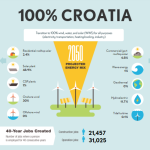ZAGREB, January 20, 2020 – The Istrian coal mines in Raša can have a negative impact on local food production, despite the fact that mining in the area stopped many years ago, a group of scientists warns in the International Journal of Coal Geology.
“The most important outcome of this study is the fact that it has undoubtedly confirmed that Raša coal is being leached away by underground water, which contaminates the local environment with a number of potentially toxic trace elements,” reads an article recently published in the International Journal of Coal Geology.
The study lists selenium, barium, vanadium, uranium, and strontium as the toxic trace elements found in studied samples. The authors of the study emphasize the importance of further hydrogeochemical environmental research.
The Istrian Raša coal mines cover a technological landscape stretching over 200 square kilometres, with more than 14 km of underground mining corridors.
Following their closure after a 400-year-era of coal mining, the coal-mine shafts have become filled with water, making it necessary to conduct a comprehensive geochemical, petrological, and mineralogical analyses of Raša coal specimens which have been exposed to coal-mine water, it is stated in the study, authored by nine experts, one of whom is from Croatia.
The Raša coal is known for its unusually high organic sulphur content. The content of organic sulphur in a sample of ash was 9.87% out of 9.92% total sulphur. Overall, the high organic sulphur content of the Raša coal gives it an extreme position in the consideration of coal chemistry, it is stated in the study.
The coal-bearing beds are up to 400 metres thick, and are tectonically extremely disrupted. Due to tectonics, some parts of the coal mines are located 300 metres below mean sea level (MSL). The deepest parts descend from Raša (400 metres below MSL) to Plomin (500 metres below MSL).
In almost four centuries of coal mining in Istria, approximately 40 million tonnes of coal were excavated at Raša, with almost half of the total quantity excavated in the period from 1945 to 1984, and the largest coal production occurring in 1942, when 1.16 million tonnes were excavated. The last coal carriage was emptied on 28 May 1999.
The amount of coal that remains underground is estimated at 4.4 million tonnes. The remaining coal layers, exposed to underground waters, are contaminating local streams with potentially toxic trace elements, which poses a danger to the local population, experts warn.
More news about environmental protection can be found in the Lifestyle section.










